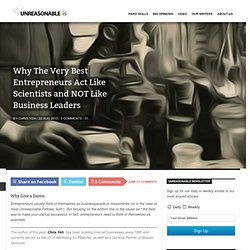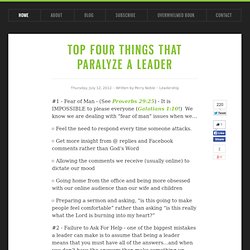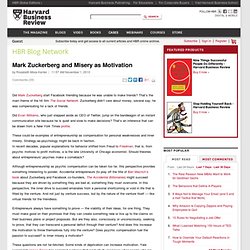

Why The Very Best Entrepreneurs Act Like Scientists and NOT Like Business Leaders. Why Give a Damn: Entrepreneurs usually think of themselves as businesspeople or missionaries (or in the case of most Unreasonable Fellows, both!).

But focusing on the bottom line or the cause isn’t the best way to make your startup successful. In fact, entrepreneurs need to think of themselves as scientists. The author of this post, Chris Yeh, has been building internet businesses since 1995 and currently serves as the VP of Marketing for PBworks, as well as a General Partner at Wasabi Ventures. As an investor, my first preference is to invest in a sure thing. Sadly, this is seldom possible. Nate Silver’s book highlights this difference: “Risk, as first articulated by the economist Frank H. Uncertainty, on the other hand, is risk that is hard to measure. In the startup world, your job as an entrepreneur is to convert uncertainty into risk. If you view your startup through the lens of the businessperson, your focus is probably to assemble enough resources to eliminate the risk. Leaders. Le management de l’émotionnel : De l’intelligence protectrice à l’intelligence collective. Marketing Team.
JWT Intelligence. Entreprise 2.0 et leadership. Il y a bien longtemps que je n’avais pas traité précisément du sujet du leadership, ce un petit détour par le monde anglo-saxon comme tous les vendredi avec cet article de Gary sur le social business et le leadership me permet d’y revenir.

De nombreuses organisations souhaitent évoluer pour devenir plus ouvertes aux usages sociaux, mais cela se cristallise sur la façon dont les structures, les rôles et les relations doivent changer pour s’adapter à l’entreprise 2.0. C’est la direction elle-même qui doit être le point de départ pour ce changement organisationnel. Gary met en avant principalement 5 compétences, voyons ce qu’il en est. Un monde qui change Le leader est au cœur de la transformation en entreprise 2.0 et à un rôle dans les changements à venir et à conduire.
Top Four Things That Paralyze A Leader. Top Four Things That Paralyze A Leader Perry Noble #1 - Fear of Man - (See Proverbs 29:25) - It is IMPOSSIBLE to please everyone (Galatians 1:10!)

We know we are dealing with “fear of man” issues when we… Feel the need to respond every time someone attacks. Get more insight from @ replies and Facebook comments rather than God’s Word Allowing the comments we receive (usually online) to dictate our mood Going home from the office and being more obsessed with our online audience than our wife and children Preparing a sermon and asking, “is this going to make people feel comfortable” rather than asking “is this really what the Lord is burning into my heart?”
#2 - Failure to Ask For Help - one of the biggest mistakes a leader can make is to assume that being a leader means that you must have all of the answers…and when you don’t have the answers then make something up. . #3 - Fear of Making the Wrong Decision - if you haven’t screwed up at some point…then you’re not leading well. La Chine va représenter 40 % de la croissance de l'électricité verte. Transformational Leaders. Stanley McChrystal: Listen, learn ... then lead.
ETech 09 Keynote: Work on Stuff that Matters. Mark Zuckerberg and Misery as Motivation - Rosabeth Moss Kanter. By Rosabeth Moss Kanter | 11:57 AM November 1, 2010 Did Mark Zuckerberg start Facebook friending because he was unable to make friends?

That’s the main theme of the hit film The Social Network. Zuckerberg didn’t care about money, several say; he was compensating for a lack of friends. These could be examples of entrepreneurship as compensation for personal weaknesses and inner misery. Strategy-as-psychology might be back in fashion. Although entrepreneurship as psychic compensation can be taken too far, this perspective provides something interesting to ponder. Entrepreneurs always have something to prove — the viability of their ideas, for one thing. These questions are not far-fetched. Restless dissatisfaction — that feeling that something isn’t quite right — propels entrepreneurship and innovation. Looking at psychic compensation has practical implications. PRO : Professions, Réseaux, Organisations. Professeur, AGROPARISTECH Membre de l'équipe PRO du CMH.

Discipline : sociologie Adresse professionnelle : 63 quai de Seine 75019 Paris(33) 6 71 99 52 11 Adresse professionnelle secondaire : Professeur de sociologie à AgroParistech, Michel Villette a rejoint l'équipe PRO depuis 2005. Après une HDR sous la direction de Michel Offerlé (Paris Sorbonne, 1992), il est revenu à l'enseignement supérieur d'abord à l'ESCP-Europe (1990-92) puis à AgroParistech depuis 1995. Au cours de sa carrière il a été consultant auprès de compagnies internationales comme Danone, Saint-Gobain, Lafarge, Matra, Exon, Eastman Kodak, EDF, Crédit Mutuel, Wafabank et professeur invité à l’Université de Californie Berkeley,1977 ; Helsinki School of Economics, 1995 ; University of Pennsylvania- Wharton Business School, 2006 ; Universidade Federal de Sào Carlos, Brasil, 2007 ; University of Warsaw, Pologne, 2008, 2009, Kanawaga University, Japon, 2009.
Harvard business review interviews of CEO. Spiritual Intelligence and Transformational Leadership.